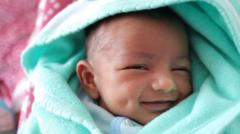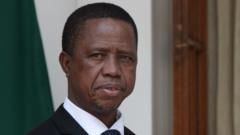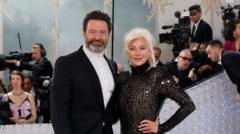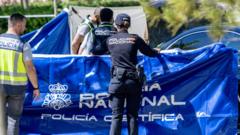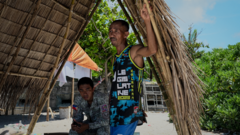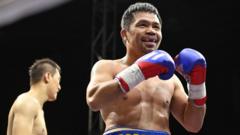As one of three Filipino cardinals participating in the conclave, Cardinal Pablo David discusses his unexpected journey to the papacy, the challenges faced by the Catholic Church in the Philippines, and his advocacy for the marginalized amid a turbulent political backdrop.
Filipino Cardinal David Reflects on His Unexpected Role in the Papal Conclave

Filipino Cardinal David Reflects on His Unexpected Role in the Papal Conclave
Cardinal Pablo Virgilio David, a key figure among Filipino clergy, shares insights on his elevation and the church's transformation in the Philippines.
Cardinal Pablo Virgilio David, recently appointed and one of three Filipino cardinals participating in the conclave, reflects on his surprising elevation, stating, "Not even in my wildest imagination did I think this would happen." From his cathedral in Caloocan, on the outskirts of Manila, he prepares to join the other cardinals in selecting the next pope.
Unlike many of his fellow cardinals, David is a humble bishop of a diocese largely composed of slum dwellers and urban poor. He believes that Pope Francis aimed to incorporate cardinals who have a direct connection to the grassroots and the church's mission to serve the marginalized.
Having only served as a cardinal for five months since his elevation last December, Cardinal David epitomizes the late pontiff's dedication to reconnecting the church with its impoverished community. He is fondly called "Apu Ambo" by his congregation and has dedicated much of his life to advocating for social justice, especially in his diocesan community.
The Philippines hosts the largest Roman Catholic population in Asia, with nearly 80% of its 100 million citizens identifying as Catholic. The prominence of Cardinal Luis Antonio Tagle, also from the Philippines, highlights the nation's significance in the church with speculation surrounding his potential candidacy as the next pope.
However, the Church in the Philippines grapples with societal challenges, including political pressures on its doctrines regarding divorce and family planning, as well as a competition for followers from newer charismatic denominations. Cardinal David acknowledges the shifting dynamics but insists on the need for the Church to remain relevant to modern society.
He recalls the critical support from Pope Francis during his resistance to former President Rodrigo Duterte's controversial war on drugs, which led to the deaths of thousands. David's outspoken criticism of this brutal campaign drew threats to his life, but he faced these challenges with resilience, compelled by a moral responsibility to provide sanctuary and rehabilitation for those targeted by law enforcement.
With the historical backdrop of the church's influence in the Philippines, Cardinal David notes that the church's stance on socio-political issues has evolved significantly over the decades. After years of political entanglement, many priests, including David, align with the principles of liberation theology, advocating for the poor and unprivileged.
While the church's current influence appears diminished compared to previous decades, Cardinal David emphasizes the importance of humility and engagement with the public. As the conclave approaches, he reiterates that it is not the role of the church to govern but to offer moral guidance in partnership with political structures.
As discussions unfold over contemporary issues such as divorce legislation, the church's ability to adapt to societal needs remains critical. Cardinal David expresses hope for constructive dialogue as politicians increasingly assert their independence from religious institutions, signifying a changing landscape for the Catholic Church in the Philippines.

